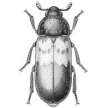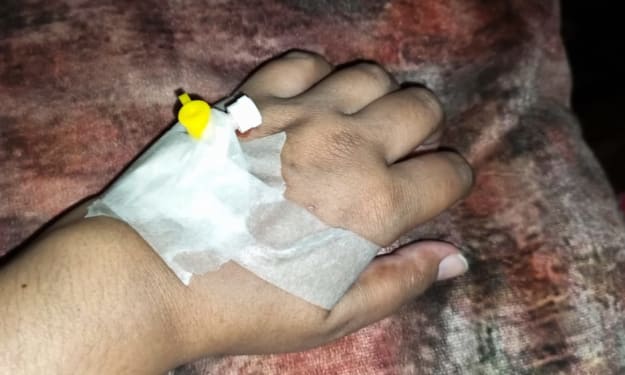
There was a fire in her eyes that made the rest of the world fade to gray. It wasn’t just a reflection of the flame she held in her right hand, a Molotov cocktail dripping incandescent fuel. He saw the light of her internal rage burning there. He was momentarily transfixed, and simply watched as she bent like a bow and hurled the bottle. His eyes never left her, so he didn’t see when the glass shattered beyond the barricade, igniting the legs and feet of their opponents.
“We said, ‘No!’” she screamed, as more fire rained down on them from others in the street, and from the rooftops above.
And then she was running toward the barricade, joining others who were tearing it apart. He fell in with them, moving benches, tossing chairs and bookcases to make a gap. Behind them, someone had released the herd, set them running, to turn them against those who would take them by force. He could hear them over the din, now, the sounds of frightened cattle. A big bull was in the lead, bellowing. His horns and head had been painted red, and he wore red hand prints on his sides. The effect was terrifying.
He looked around to find her, and suddenly she was there, knocking the wind out of him as she pushed him back, out of the path of the stampede. Everyone else had lined up on either side of the gap, two lines of people fanning out, blocking the cross streets, waving their arms, funneling the cattle through the barricade, toward the militia on the other side. A few of the interlopers raised their rifles momentarily, but quickly realized it was hopeless. They ran. As the herd poured through the gap they spread out, trampling the unwary ones who had stood their ground too long.
On the other side of the barricade, waiting under the dark viaduct, between the shells of derelict cars, others from the compound picked off the rest. The tires of their vehicles had been flattened, but not one of them made it far enough to discover this. In the confusion of the stampede, and its aftermath, the bewildered militiamen fell to knives, and to garrotes, and to a slingshot. It was over when twenty bodies wearing bulletproof vests lay still in the street and on crumbling sidewalks.
Over the next few hours, the cows wandered home.
***************
The day before, when he arrived, the compound was in high-spirited turmoil. She was the one who welcomed him, showed him around amidst the chaos.
“Riordan.”
“I’m Siobhan. Everyone calls me Von. I’m kinda the unofficial tour guide around here. You picked a helluva day to show up. Where you from?”
“Milwaukee.”
“How’s it going up there?”
He shrugged and gave her a sad smile. “I’m here, aren’t I?”
She nodded, eyeing him with concern, but didn’t press him. “Know how to read?”
“Sure.”
She brought him to one of the brick three flats, up the cracked concrete stairs, into the front room. The apartment was a library, and a meeting space. It was lined with bookshelves, and held a big round table ringed with chairs. A group sitting there was arguing.
“They won’t stop. If we give them what they want, they’ll just keep coming back.”
“If we use non-violent tactics we may be able to win them over.”
“They came armed to the teeth, and gave us an ultimatum. We’re not going to win them over with some superior value system. We already tried talking to them.”
“You don’t have to do anything violent. There are enough of us willing to fight, all you have to do is stay out of the way.”
“I don’t want to do nothing.”
“Then do something you’re not conflicted about.”
Riordan quietly scanned book titles while Von briefly jumped into the discussion. The conversation continued and she turned back to him, directing him to a big book on a low table between two chairs against a wall.
“This is the rule book. Anybody wants to make a rule, we talk about it and if it’s adopted by consent it goes in here. Rules can be changed through appeal or amendment, by anyone, at any general meeting. This is a record of all the rules that have been enacted, it’s not all in effect now. A living document, constantly changing. We keep all the records so we see what didn’t work in the past and why. If you want to stay, you should read it. You can come in here anytime. There are other copies around. Mostly we just try to keep one rule in mind, and this is all the fiddly bits around it.”
“What’s the rule?”
“Do what you want, as long as it does no harm.”
“Really? That’s kind of vague. How do you define harm?”
She pointed at the big book. “Fiddly bits.”
He nodded, and she beckoned him to follow her as she continued his orientation.
“You hungry?”
He nodded again, a little embarrassed to admit it, and she led him outside, down the steps, across the street to another house that was shaded by two tall oak trees. There was a multicolored hand-painted sign above the door that read “Ye Olde Feede Bag.”
“This is the Feed Bag, obviously. A block over,” she pointed, “is the Greasy Spoon. You can get something to eat anytime you want. There’s always something ready, all day, all night. Changes with the seasons. Right now we’ve got a lot of tomatoes, lot of melons, summer shit. Most of the summer there’s a crew canning every day. You know how to cook?”
He shook his head. They had walked through the house, which was used for food storage. Shelves lined the walls and stood in rows in the rooms they passed through, filled with jars and bags. The last room was an empty kitchen dominated by a wood burning cook stove, surrounded by prep tables, more food and spices. He followed her out the back door and into a covered summer kitchen bustling with activity, full of good smells.
“If you want to learn, plenty of people to teach you. Go ahead, get your belly full.”
He hesitated, anxiety spiking. “I don’t have anything to trade.”
“No worries, there’s no strings. Just eat.”
She said it nonchalantly, but he could hear the pride in her voice. There was the pride of being able to offer such a gift freely, the pride in plenty. She was proud of their way of life, and of the fruits of their combined labor. He stood in a short line of people being served. He had time to look around, notice the berry patch and herb garden, the riot of flowers, the abstract metallic sculpture, and the fruit trees against a brick wall. He was given a bowl full of stew and a plate of sliced vegetables. He thanked the cook, and looked around for Von. She was seated at a picnic table nearby with a few others. He joined them. There was real meat in the stew, potatoes, carrots, fresh herbs. As he ate, she told him more about their world.
“The Forestry folks have a nursery a few blocks over. They plant trees and tend them pretty much non-stop. Trees for wood, shade, fruit. Myco crew has mushroom gardens, indoor and outdoor. The Livestock team does cattle, chickens, bees, rabbits, crickets. Ducks and geese down at Sherman Park. Growies work the gardens and food forests, harvest hay, that kind of thing. Engineers, builders, maintenance crews take care of shit that breaks and more. Scavengers find all kinds of useful things. Weavers make cloth and garments. We have an herbal collective for medicines. There are artists, writers, physical therapists. We’ve even got a fucking dentist who’s taking apprentices. Yoga every morning. Most folks do a variety of work. Everybody helps. Everybody eats.”
He listened, overwhelmed by it all. This place, there must be a catch. His life, his world had been so different. A memory rose to the surface, welling up like a boil that needed to be lanced. He remembered the baby born blind. The burden. Drowned in the lake in a sack.
“Everybody helps?” he questioned.
“That’s right.”
“What if you’re blind? Or can’t walk?”
She heard the challenge in his voice, the pain. She responded gently, “There’s a saying we like here. ‘From each according to ability, to each according to need.’ Means, in part, we don’t expect everybody to be able to do everything. Even able-bodied people. We all have differences. Nobody gets left out. We’ve got some folks who can’t walk, some who can’t talk or even hold a spoon to feed themselves. Everybody helps. Some help us remember our humanity. We can all feel pain. And joy.”
The tears that had filled his eyes overflowed now, spilling hot down his cheeks. He thought about all the meals he’d paid for with his body when he had nothing else to trade. All the times he slept rough in old cars or worse, when he couldn’t bear to pay the price for anything better, hoping to God a patrol didn’t find him. Von let him cry. The pain needed a way out, shouldn’t be stifled or shushed. When his tears slowed, she offered him her hand, which he looked at blankly for a minute, like it was a foreign object. Slowly, he slid his hand into hers, and knew he didn’t want to leave.
Then she explained to him the situation they were in.
“Some armed fascist bastards showed up a few days ago and demanded food for their protection services. They hassled some Growies first. They offered the fascists some of the day’s harvest, but told them we don’t need protection. They didn’t want the produce. They said they wanted to talk to whoever’s in charge, they wanted to make a deal. The Growies looked at each other and said, ‘In charge of what? We’re in charge.’ The leader of the assholes said, ‘Bullshit.’ Because they don’t understand the concept of not having someone in charge. So they hassled another crew, and got the same answer. Finally, they found the library, and got the same answer, but more detailed. We told them they were welcome to be part of the collective, but they didn’t want that. They tried to sell us protection from themselves. If we give them whatever they want, they won’t rape and murder people. What do you think of that?”
“I think I hate them.” They were another flavor of everything he had escaped from.
“Yeah, me too.” The spark in her eyes was a hint of the fire within. “These people who have no respect for our lives and autonomy, they don’t understand decentralized authority. They expect to deal with a chief, a mayor, a council, in a place where authority lives. If we give them a focus, a central point to approach, they’ll go for it. They won’t know what hit them. So this is what we’re gonna do…”
*************
After the bodies were stripped and buried, after the barricades were dismantled and put away, life went on. He began learning to cook. He worked in the gardens. He took meals to the folks who couldn’t do for themselves. He read the rule book cover to cover. He learned how to drive the cattle, with some others, all the way down to Sherman Park where they camped out while the herd grazed for a month at the end of the summer. By the time the fall equinox arrived, his nightmares had ceased. And when he wandered home, he saw a different kind of fire burning in her eyes, just for him.
About the Creator
Enjoyed the story? Support the Creator.
Subscribe for free to receive all their stories in your feed. You could also pledge your support or give them a one-off tip, letting them know you appreciate their work.






Comments
There are no comments for this story
Be the first to respond and start the conversation.